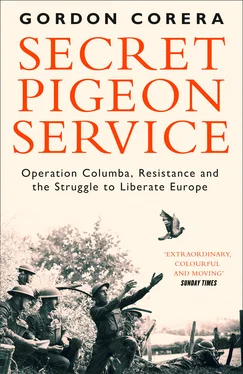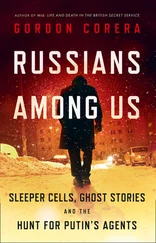1 ...8 9 10 12 13 14 ...17 CHAPTER THREE
The Debaillie family gathered in the large building in Lichtervelde that doubled up as a grocery store and a family house. A local farmer had found the pigeon in the field that July morning in 1941 and his wife had brought it to them hidden in a sack of potatoes. It was just over a year since the Nazi war machine had swept through Belgium and the farmer had taken it to the Debaillies because he knew they were patriots. But now the family had to decide what being a patriot really meant.
Their task was initially to decide the pigeon’s fate – and perhaps with it, their own. The decision was far from easy. The three brothers, Gabriel, Arseen and Michel, and two sisters, Marie and Margaret, deliberated over what to do with the bird. Two of the brothers differed. Gabriel thought it best not to get involved. It was true the family were ‘patriots’ who hated the Germans, rather than ‘blacks’, but they had never engaged in any overt act of resistance. The risk was too great. They had too much to lose. But Arseen felt the need to act. He was the most ambitious of the brothers and the keenest to take risks. The pigeon had come to them with a call for help and they should not turn it away – it was their duty. Even though he was the youngest brother, he got his way. Margaret, the younger of the sisters, backed him, whilst her elder sister Marie was more cautious.
Once the decision had been made, there was no reluctance or dissent on the part of the other members of the family. They were and remained united. Their father, the founder of the business, had died a few years earlier and the siblings were a close-knit family who ran the concern together and knew they could trust each other. Spying would be a family affair. But what were they actually going to do? They knew that to make the most of the opportunity that the pigeon had brought their way, they needed help. And so they turned to two friends. One was Hector Joye from Bruges, who spoke English and loved military maps. The other was a Catholic priest, Father Joseph Raskin. The Debaillies knew Raskin through another brother of theirs who was a missionary in China. He had been taught by Raskin and had invited the older priest to stay with the family before the war. The priest had become a frequent overnight house-guest, with his own regular room. The two sisters, Marie, aged 48, and Margaret, nearly 40, were particularly devoted to Raskin. In turn, Raskin was a friend of Hector Joye, having presided over his wedding. So the circle of trust between the friends was complete. This was the way many early resistance groups were born – not as soldiers or spies but as groups of friends who felt such deep anger at the occupation of their homeland that they were willing to accept the risk of trying to do something about it. The bonds of friendship offered trust and some degree of protection but this often had to compensate for a lack of experience in the world of espionage against a formidable enemy.
Within a day of the pigeon’s arrival, the budding spy ring had gathered in Lichtervelde. Joseph Raskin would be the central figure. For all his outward trappings of a priest, it was as if everything in his life up to this point had prepared him for his career as a spy.
Raskin had been born in 1892 in a comfortable, detached house in Stevoort, a village of a few hundred families who all knew each other. His father had become a teacher and then principal of a local primary school. Joseph was the eldest of eleven siblings – the one they all looked up to and idolized. Culture and Catholicism were the defining characteristics of a family who would pray, sing, draw and read poetry together. From the time he was a small child and grabbed a rattle or moved to the piano, it was clear Joseph had a love of and gift for music. But the church came first. The headmaster of Joseph’s school had a brother who was a missionary and his letters from far-off lands would be read out to the pupils. That inspired Joseph to follow in his footsteps, and in 1909 he left home and joined a Belgian missionary organization called CICM – known as the missionaries of Scheut or Scheutists, after the neighbourhood of Anderlecht in Brussels where they were based. It was a strict regime – up at 5 a.m., asleep at 9 p.m., the hours between filled with prayer, study and communal living. Family visits were limited, but when Joseph returned for a few days’ holiday in 1912, his siblings found he had grown up. He was still not tall, and he continued to walk with a slight stoop that had been there from childhood, but now he proudly sported a short beard, much to their amusement. Joseph and his youngest brother would become missionaries and another brother a priest. Two of the sisters would become nuns.
When Germany declared war on Belgium on 4 August 1914, Raskin had just been ordained a sub-deacon, but he was not immune from the patriotic fervour sweeping Europe. God and country were intertwined for many at that time. But Raskin’s family were about to see up close what war really meant.
The family had moved to the town of Aarschot a few years earlier, when Raskin’s father became a school inspector. It was a small town but would become famous both in Belgium and Britain for the events of August 1914. As the Belgian army retreated, two Belgian regiments acted as a rearguard in the town and held up the German advance, much to the anger of German commanders. In their house, Raskin’s younger siblings hid in the basement and sat fearfully around a single lamp, occasionally going upstairs to peek at events from behind the curtains. When the town fell, twenty captured Belgian soldiers were shot and thrown into the river. That evening a German brigade commander was shot while standing on a balcony on the square – perhaps killed by the ricochet of a bullet fired by his own soldiers. But the Germans treated the death as an assassination and began heavy reprisals aimed at what they saw as resistance from the local population. Men were rounded up in the marketplace and then taken to a field where they were executed. In all, 156 civilians were killed over the following days. Women were said to have been victimized. The events in Aarschot were pivotal in what came to be known in Britain as ‘the rape of Belgium’, an episode ably exploited by British propagandists as their country responded to the attack on neutral Belgium by joining the war. The British spy and author William Le Queux wrote graphically of babies being bayoneted and women savaged by the German army in the town. British newspapers were filled with lurid, exaggerated accounts, which in turn helped galvanize support for war amongst the British public. And so Belgium’s war quickly became Britain’s.
The first time Joseph Raskin was arrested as a spy by the Germans he was entirely innocent. Priests and primary school teachers had been mobilized as stretcher-bearers and ambulance men for the Belgian army. Raskin was put to work at Beverlo ferrying wounded soldiers around. As word reached him of events in Aarschot, he became desperate for news of his family. At 6 a.m. one Sunday he put on civilian clothes and got on his bike. A German patrol stopped him. A young man cycling in civilian clothes was highly suspicious at a time when the Germans thought every Belgian was a spy. Worse, Raskin did not have his Red Cross papers. The case seemed open and shut. He must be a spy. The sentence was death.
Raskin was taken to a fort that was being used a prison. In a car on the way he noticed that the papers regarding his case were lying on the seat next to him. He slowly edged them underneath him and then to the other side. As the car hit a particularly violent bump, he pushed them out of the side without the Germans noticing. Upon his arrival at the fort, the authorities were lost without the paperwork. In the chaos of the early days of the war, there was nothing that could be done. He would just have to be kept there.
Читать дальше












